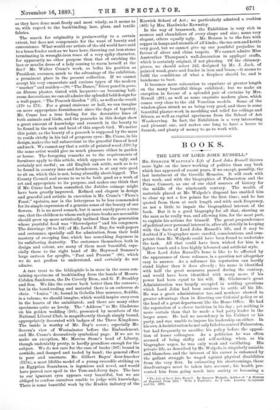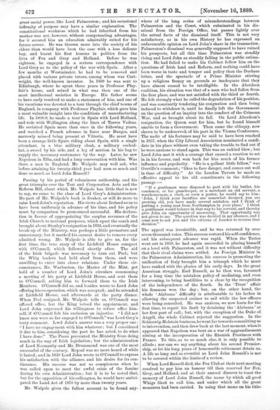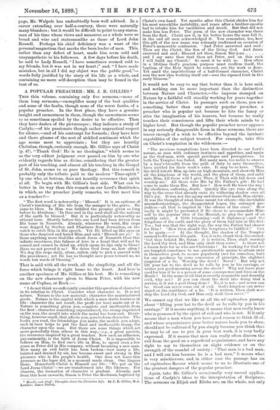BOOKS.
THE LIFE OF LORD JOHN RUSSELL.* Mn. SPENCER WALPOLE'S Life of Lord John Russell throws more light on the inner working of politics than any book which has appeared of recent years, if we except, possibly, the last instalment of the Greville Memoirs. It will rank with that work, and with the biographies of Palmerston and the Prince Consort, as one of our chief sources of history for the middle of the nineteenth century. The wealth of materials placed at Mr. Walpole's disposal has enabled him to clear up not a few points for the first time; and he has quoted from them at such length and with such frequency, as uot a little to impair the biographical interest of the book. But it is a good biography for all that, showing us the man as he really was, and allowing him, for the most part, to explain his actions for himself. The great preponderance of political over personal interest is, after all, strictly in keeping with the facts of Lord John Russell's life, and it may be doubted if a biographer more careful, conscientious, and com- petent than Mr. Walpole could have been found to undertake the task. All that could have been wished for him is a lighter touch and a less highly laboured and artificial style. How Lord John Russell's fame is like to be affected by the appearance of these volumes, is a question not altogether easy to answer. As a reformer his reputation can hardly stand higher than it does already ; his name is identified with half the great measures passed during the century, and would have been identified with many more if his power had been equal to his will. Mr. Gladstone's great Administration was largely occupied in settling questions which Lord John had been anxious to settle all his life. He was a great administrator too, and nowhere showed to greater advantage than in directing our Colonial policy or at the head of a great department like the Home Office. He had the reputation of a clever tactician in his day ; yet nothing is more certain than that he made a bad party leader in the
larger sense. He had no ascendency in his Cabinet or his party, and was unable to impose his leadership on either. In his own Administration he not only failed to control Palmerston, but had frequently to sacrifice his policy before the opposi- tion of lesser colleagues. As a politician he was often accused of being shifty and self-seeking, when, as his biographer urges, he was only weak and vacillating. His private life, as described by Mr. Walpole, is singularly amiable and blameless, and the interest of his career is enhanced by the gallant struggle be waged against physical disabilities from the very first. In estimating his shortcomings, these disadvantages must be taken into account ; his health pre- vented him from going much into society or becoming a
• The Life of Lord John Russell. By Spencer Walpole, Author of " A History of England from 1815. • With 2 Portraits. In 2 vols. London: Longman' and Co. 1889.
great social power, like Lord Palmerston; and his occasional infirmity of purpose may have a similar explanation. The constitutional weakness which he had inherited from his mother was not, however, without compensating advantages, for it secured him an education admirably suited for his future career, lie was thrown more into the society of his elders than would have been the case with a less delicate boy, and learnt his first lessons in politics from the lives of Fox and Grey and Holland. Before he was eighteen, he engaged in a serious correspondence with Lord Grey as to the policy of the war with Spain. After a few months at Westminster, he had to be removed and placed with various private tutors, among whom was Cart- wright, the well-known inventor. In 1809 he was sent to Edinburgh, where he spent three years in Professor Play- fair's house, and mixed in what was then one of the most intellectual societies in Europe. His father seems to have early resolved to make a statesman of him, and one of his vacations was devoted to a tour through the chief towns of England, in company with Professor Playfair, which gave him a most valuable insight into the conditions of manufacturing life. In 1808-9, he made a tour in Spain with Lord Holland, and rode with Wellington along the lines of Torres Vedras. He revisited Spain more than once in the following years, and watched a French advance in force near Burgos, and narrowly missed being present at Vittoria. He must have been a strange little figure riding about Spain, with a single attendant, in a blue military cloak, a military cocked- hat, a sword by his side, and a leg of mutton in his bag to supply the necessary sustenance by the way. Later, he saw Napoleon in Elba, and had a long conversation with him. Was there a man in England, Mr. Walpole may well ask, who before attaining his twenty-third year had seen so much and done so much as Lord John Russell?
Passing by his period of voluminous authorship, and his great triumphs over the Test and Corporation Acts and the Reform Bill, about which Mr. Walpole has little that is new to say, we come to the close of Lord Grey's Administration. No part of Mr. Walpole's book is fresher, or will do more to raise Lord John's reputation. His views about Ireland seem to have been uniformly in advance of his time, and his policy must by comparison be pronounced successful. His declara- tion in favour of appropriating 'the surplus revenues of the Irish Church to national purposes, which upset the coach and brought about Stanley's resignation in 1834, and eventually the break-up of the Ministry, was perhaps a little premature and unnecessary, but it marked his earnest desire to remove every admitted wrong. Mr. Walpole is able to give us, for the first time, the true story of the Lichfield House compact with O'Connell, which followed shortly after. The aid . of the Irish brigade was necessary to turn out Peel ; but the Whig leaders had held aloof from them, and were unwilling to enter into closer relations. Under these cir- cumstances, Mr. Warburton, the Master of the Mint, got hold of a number of Lord John's circulars summoning a meeting of his party at Lichfield House, and sent them to O'Connell, asking him to forward them to the Irish Members. O'Connell did so, and besides wrote to Lord John offering his co-operation, which was accepted ; and he attended at Lichfield House, and afterwards at the party dinner. When Peel resigned, Mr. Walpole tells us, O'Connell was offered office, but the King vetoed the appointment, and Lord John expressed his willingness to refuse office him- self, if O'Connell felt his exclusion an injustice. "I did not know you were so far engaged to O'Connell," was Lord Grey's testy comment. Lard John's answer was a very proper one : "I have no engagement with him whatever ; but I considered it due to him, considering the part he has acted, to do what I have done." The Peers prevented the Ministry from doing much in the way of Irish legislation ; but the administration of Lord Normanby and Mr. Drummond was one of the most successful of the century. Repaal was no more heard of while it lasted ; and in 1839 Lord John wrote to O'Connell to express his satisfaction with the alliance, and his desire for its con- tinuance. His success was not so conspicuous when he was called upon to meet the awful crisis of the famine during his own Administration ; but it is to be noted that, but for the opposition of his colleagues, he would have antici- pated the Land Act of 1870 by more than twenty years.
Mr. Walpole gives the fullest account to be found any-
where of the long series of • misunderstandings between Palmerston and the Court, which culminated in his dis- missal from the Foreign Office, but passes lightly over the actual facts of the dismissal itself. This is not very satisfactory, as in his own History he has expressed an unfavourable opinion on Lord John's share in the transaction- Palmerston's dismissal was generally supposed to have ruined_ his prospects, but all this time Palmerston was steadily rising and Lord John as steadily falling in the public estima- tion. He had failed to make his Cabinet follow him on the questions of Irish land and Reform, and nothing could have- been worse in taste and temper and policy than the Durham letter, and the spectacle of a Prime Minister stirring up a religious frenzy on grounds so inadequate that they have almost ceased to be intelligible. In the Aberdeen coalition, his situation was that of a man who had fallen from the first place, and was not satisfied with the third or fourth. He felt strongly what he called the degradation of his position, and was constantly tendering his resignation and then being induced to withdraw it, until he finally left the Government on the question of an inquiry into the conduct of the Crimean War, and so brought about its fall. On Lord Aberdeen's resignation, the Queen sent for him, but he found himself
unable to form a Government. Then came the obloquy, now- shown to be undeserved, of his part in the Vienna Conference Thenadir of his fortunes may be said to have been reached in 1857, when the City Liberal Association nominated a candi- date in his place without even taking the trouble to find out if
he were anxious to stand again. This was an unkind blow; but Lord John met it with a courage that caused a reaction to set in in his favour, and won back for him much of his former' influence and popularity. "He is a gallant little fellow," was Greville's comment ; "likes to face danger, and comes out well in time of difficulty." At the London Tavern he made an effective appeal to his old constituents in the following passage :—
"If a gentleman were disposed to part with his butler, his coachman, or his gamekeeper, or a merchant an old servant, a. warehouseman, a clerk, or even a porter, he would say to him:
John, I think your faculties are somewhat decayed, you are growing old, you have made several mistakes, and I think of putting a young man from Northampton in your place.' I think a gentleman would behave in that way to his servant, and thereby give John an opportunity of answering. That opportunity was not given to me. The question was decided in my absence, and I come now to ask you and the citizens of London to reverse that decision."
The appeal was irresistible, and he was returned by over seven thousand votes. This success restored his self-confidence, and his subsequent advance was rapid. When the Tories' went out in 1859, he had again succeeded in placing himself on a level with Palmerston, and it was not without difficulty that their rival claims were settled. As Foreign Minister in the Palmerston Administration, his success in promoting the- unification of Italy brought him a triumph which he must have ranked with the glories of his early days. In the great American struggle, Earl Russell, as he then was, favoured for a long time the mistaken policy of mediating, and even: intervening, to bring hostilities to a close by the recognition of the independence of the South. In the 'Trent' affair his firmness won the day ; but, on the other hand, the,' whole 'Alabama' difficulty is attributable to his laches in_ allowing the suspected cruiser to sail while the law officers were being consulted. He was anxious, we now learn for the- first time, to repair his fault by detaining the 'Alabama' at her first port of call ; but, with the exception of the Duke of Argyll, the whole Cabinet rejected the suggestion. In the- Schleswig-Holstein business, b e went far towards committing us. to intervention, and then drew back at the last moment, when it appeared that Napoleon was bent on a war of aggrandisement aiming at the incorporation of the Rhenish Provinces with France. To this, as to so much else, it is only possible to. allude ; nor can we say anything about his second Premier- ship, or let his long years of honourable retirement detain us..
A life so long and so eventful as Lord John Russell's is not to be covered within the limits of a review.
When Lord Russell died, the Fox Club at their next meeting resolved to pay him an honour till then reserved for Fox, Grey, and Holland, and at their annual dinners to toast the
memory of Lord John Russell, the name by which all good Whigs liked to call him, and under which all the great measures had been carried. In using that name on his title-
page, Mr. Walpole has undoubtedly been well advised. In a career extending over half-a-century, there were naturally many blunders ; but it would be difficult to point to any states- man of his time whose views and measures as a whole were so broad and wise and statesmanlike as those of Lord John Russell. Perhaps his chief deficiency was a want of the personal magnetism that marks the born leader of men. This, rather than any defect of heart, made him seem cold and unsympathetic to his followers. A few days before his death, he said to Lady Russell, "I have sometimes seemed cold to my friends, but it was not in my heart ;" and, "I have made mistakes, but in all I did my object was the public good,"— words fully justified by the story of his life as a whole, and containing no more self-deception than may be found in the best of us.




















































 Previous page
Previous page